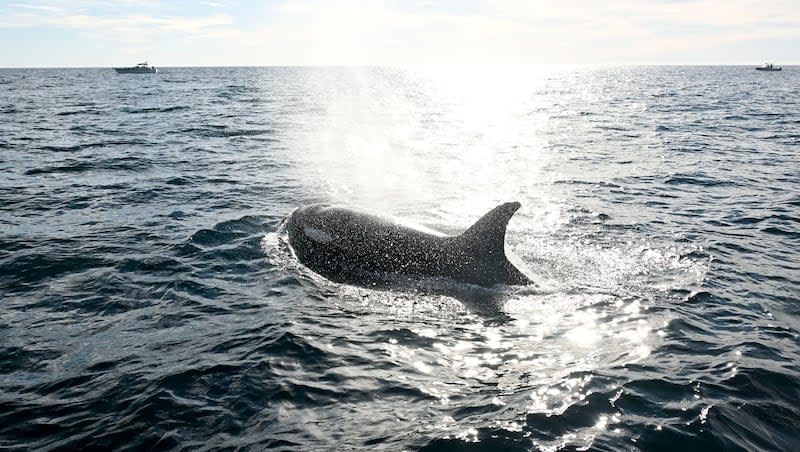Shark-killing orcas could be a signal of a changing ecosystem

Great white sharks have a new predator: the orca. Also known as the killer whale, orcas are changing from their traditional prey (such as seals) to unnatural prey. In this case, the great white shark.
Scientists have noticed this change and there’s a new video released by researchers that shows a lone orca whale hunting and killing a great white shark. And it’s surprising scientists.
Traditional orca habits
Orca hunting habits are well known to scientists. Orcas normally hunt in groups, called pods, and use echolocation to find their prey, according to Smithsonian Magazine. If orcas in the Antarctic Ocean find a seal on an ice floe, they’ll create their own waves in an effort to wash the seal off the ice, per Smithsonian Magazine.
Another common hunting habit orcas use is “intentional stranding,” where orcas will beach on coastlines, grab their prey and drag it back into the ocean, per Smithsonian Magazine. Mothers teach this to their young by forcing them onto the beach and repeating it until their young can return to the water on their own.
So when scientists found out a lone orca killed a great white shark, it went against everything they knew about orcas’ hunting patterns.
Why the change in hunts
In a new study published in the African Journal of Marine Science, scientists revealed new footage of a lone orca hunting and killing a great white shark off the coast of South Africa. The orca managed to kill the shark in less than two minutes.
The team of researchers had been following a pair of orcas, known as Starboard and Port, when they noticed a juvenile shark approach the surface of the water, followed by Starboard, per The Guardian. The scientists watched, as did a group of tourists doing shark cage dives nearby, as Starboard grabbed one of the shark’s fins before ripping out its liver.
Scientists have several hypotheses as to why orcas are now killing sharks. One hypothesis is that Starboard and Port are part of a group of orcas that normally stay in the open ocean, but fishing is depleting their natural food source so they’re forced to come closer to shore, per National Geographic.
One of the lead authors of the study, Alison Towner from Rhodes University, told CNN, “While we don’t have solid evidence on the specific drivers, the arrival of the killer whale pair could be linked to broader changes in the ecosystem. It’s clear that human activities, such as climate change and industrial fishing, are stressing our oceans. To fully grasp these dynamics, additional research and funding are essential.”
The co-author of the study, Primo Micarelli, told The Guardian, “Despite my awe for these predators, I’m increasingly concerned about the coastal marine ecology balance.”
This change in hunting habits can cause a major imbalance in the ecosystem. Towner told BBC, “Disruptions in the balance of apex predators can affect other species too. Endangered African penguins could face increased predation by cape fur seals (if the fur seals are not being eaten by) white sharks.”
Great white sharks are at risk
According to National Geographic, shark populations have been declining in South Africa and overfishing has increased a threat against great white sharks. Orcas have also been known to scare off shark populations, but researchers aren’t sure where those shark populations go, per CNN.
One such example of sharks fleeing is in the Farallon Islands off California’s coast, according to Smithsonian Magazine. This area is a hot spot for great white sharks to come feed on elephant seals, but it’s been noted that if an orca appears in the area, great white sharks will flee and not return for at least a year.
Shark corpses have been spotted on beaches without their livers since 2015, according to National Geographic. In South Africa, sevengill sharks have disappeared, along with great white sharks, and are being replaced as top predators by other species such as the copper shark.

